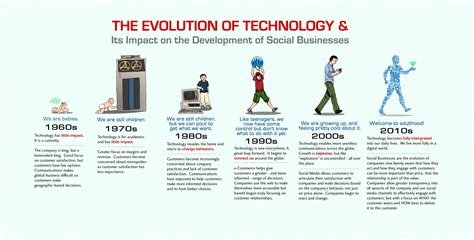The Evolution of Digital Technology in Business
Over the past few decades, the evolution of digital technology has had a profound impact on the business world. The introduction of computers, the internet, and mobile devices has transformed the way companies operate, communicate, and interact with customers. This rapid advancement in technology has led to increased efficiency, productivity, and competitiveness in the market.
One of the key benefits of digital technology in business is the automation of repetitive tasks. With the use of software and tools, companies can streamline processes such as accounting, inventory management, and customer service. This not only saves time and reduces errors but also allows employees to focus on more important tasks that require human intelligence and creativity.
Furthermore, the advent of digital technology has enabled businesses to reach a wider audience and target customers more effectively. With the rise of social media and online advertising, companies can engage with consumers in real-time and tailor their marketing strategies to specific demographics. This has leveled the playing field for small businesses, allowing them to compete with larger corporations on a global scale.
Another significant impact of digital technology in business is the shift towards remote work. With the ability to communicate and collaborate online, employees can now work from anywhere in the world, leading to greater flexibility and work-life balance. This has also reduced the need for physical office spaces, saving businesses money on rent and utilities.
In conclusion, the evolution of digital technology has brought about significant changes in the business world, from automation and efficiency to global reach and remote work. As technology continues to advance, businesses must adapt and embrace these changes to stay competitive in an increasingly digital marketplace.
The Role of Digital Marketing
Digital marketing plays a crucial role in today’s business world. With the advancement of technology, businesses are now able to reach a wider audience through various online channels. Social media platforms like Facebook, Instagram, and Twitter have become key tools for businesses to connect with their target customers. By leveraging digital marketing strategies such as social media advertising, content marketing, and email campaigns, businesses can increase brand awareness and drive sales.
In addition to social media, businesses can also use search engine optimization (SEO) to increase their online visibility. By optimizing their website for search engines, businesses can appear higher in search results, making it easier for potential customers to find them. This not only helps attract more traffic to their website but also improves their credibility and authority in their industry.
Another important aspect of digital marketing is data analytics. By tracking and analyzing customer behavior online, businesses can gain valuable insights into their preferences and purchasing patterns. This allows businesses to tailor their marketing strategies and personalize their messaging to better meet the needs of their customers. With the help of data analytics, businesses can make informed decisions and optimize their marketing campaigns for better results.
The Importance of Data Analytics
Data analytics tools have revolutionized the way businesses operate in today’s digital age. By utilizing data analytics, companies can gather valuable insights from vast amounts of information, allowing them to make strategic decisions based on facts rather than intuition. This data-driven approach has proven to be highly effective in improving various aspects of business operations, from marketing strategies to supply chain management.
One of the key benefits of data analytics is its ability to enhance customer experiences. By analyzing customer data, businesses can better understand their needs and preferences, allowing them to personalize their products and services to cater to individual customer demands. This level of personalization not only increases customer satisfaction but also fosters customer loyalty, leading to repeat business and positive word-of-mouth recommendations.
Moreover, data analytics can also help businesses identify new opportunities for growth and innovation. By analyzing market trends and consumer behavior, companies can uncover untapped markets, emerging trends, and potential areas for expansion. This proactive approach enables businesses to stay ahead of the competition and position themselves as industry leaders in their respective sectors.
The Impact on Communication and Collaboration
With the advancement of digital technology, communication and collaboration in the business world have been significantly transformed. In today’s fast-paced business environment, companies no longer have to rely solely on face-to-face meetings or phone calls to exchange information and ideas. Instead, they can leverage various digital tools and platforms to communicate and collaborate effectively, regardless of their physical location.
One of the key advantages of digital technology in communication and collaboration is the ability to streamline and facilitate real-time communication. Tools such as email, instant messaging, video conferencing, and project management software allow employees to communicate instantly and efficiently, leading to faster decision-making and problem-solving. Moreover, digital collaboration platforms enable teams to work together on projects, share files, and provide feedback in a seamless and transparent manner.
Another significant impact of digital technology on communication and collaboration is breaking down geographical barriers. In the past, businesses were limited by the physical distance between team members and partners, making it challenging to work together on projects. However, with the rise of digital tools and platforms, companies can now collaborate with stakeholders from different parts of the world effortlessly. This not only enhances teamwork and innovation but also opens up new opportunities for global expansion and partnerships.
Furthermore, digital technology has improved the accessibility and flexibility of communication and collaboration. With the prevalence of mobile devices and cloud-based solutions, employees can easily access and contribute to projects from anywhere at any time. This flexibility not only boosts productivity but also ensures that teams can stay connected and informed, even when working remotely or on the go.
In conclusion, the impact of digital technology on communication and collaboration in the business world cannot be understated. From streamlining real-time communication to breaking down geographical barriers and enhancing accessibility, digital tools and platforms have revolutionized the way companies work together. As businesses continue to embrace digital transformation, the opportunities for improving communication and collaboration will only continue to grow.
The Future of Digital Technology in Business
In today’s fast-paced business world, the use of digital technology has become essential for companies to thrive and succeed. From automation to data analytics, companies are leveraging digital tools to streamline processes, boost productivity, and make more informed decisions. As we look ahead to the future, the impact of digital technology on the business world is only set to grow.
One of the key trends shaping the future of digital technology in business is the rise of artificial intelligence (AI). AI has the potential to revolutionize how businesses operate by automating repetitive tasks, predicting customer preferences, and enhancing decision-making processes. Companies that harness the power of AI will be able to gain a competitive edge and drive innovation in their industries.
Another important aspect of the future of digital technology in business is the increasing focus on cybersecurity. With the rise of cyber threats and data breaches, businesses will need to invest in robust security measures to protect their sensitive information and customer data. As digital technologies become more integrated into business operations, cybersecurity will be a top priority for companies of all sizes.
Furthermore, the future of digital technology in business will also be shaped by advancements in cloud computing and mobile technology. Cloud computing allows businesses to access data and applications remotely, making it easier for employees to collaborate and work from anywhere. Mobile technology, on the other hand, enables companies to reach customers on-the-go and provide personalized experiences through mobile apps and websites.
Overall, the future of digital technology in business is bright and promising. Companies that embrace digital innovations and adapt to the changing landscape will be well-positioned to thrive in the digital age. By investing in AI, cybersecurity, cloud computing, and mobile technology, businesses can stay ahead of the curve and drive growth in a rapidly evolving market.



